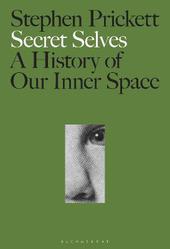
|
Secret Selves: A History of Our Inner Space
Hardback
Main Details
| Title |
Secret Selves: A History of Our Inner Space
|
| Authors and Contributors |
By (author) Professor Stephen Prickett
|
| Physical Properties |
| Format:Hardback | | Pages:272 | | Dimensions(mm): Height 229,Width 152 |
|
| Category/Genre | Literary theory
Literary studies - general
Philosophy of the mind |
|---|
| ISBN/Barcode |
9781501372469
|
| Classifications | Dewey:155.2 |
|---|
| Audience | |
|---|
| Illustrations |
25 color and 30 b/w illus
|
|
Publishing Details |
| Publisher |
Bloomsbury Publishing Plc
|
| Imprint |
Bloomsbury Academic USA
|
| NZ Release Date |
26 August 2021 |
| Publication Country |
United States
|
Description
Who are we and how do we define our inner selves? In his last work, Professor Stephen Prickett presents a literary and cultural exploration of our inner selves - and how we have created and written about them - from the Old Testament to social media. What he finds is that although our secret, inner, sense of self - what we feel makes us distinctively 'us' - seems a natural and permanent part of being human, it is in fact surprisingly new. Whilst confessional religious writings, from Augustine to Jane Austen, or even diaries of 20th-century Holocaust victims, have explored inwards as part of a path to self-discovery, our inner space has expanded beyond any possible personal experience. This development has enhanced our capacity not merely to write about what we have never seen, but even to create fantasies and impossible fictions around them. Yet our secret selves can also be a source of terror. The fringes of our inner worlds are often porous, ill-defined and susceptible to frightening forms of external control. Mystics and poets, from Dante to John Henry Newman or Gerard Manley Hopkins, sought God in their secret spaces not least because they feared the 'abyss beneath.' From the origin of human consciousness through modern history and into the future, Secret Selves uses literature to consider the profound possibilities and ramifications of our evolving ideas of self.
Author Biography
Stephen Prickett was an Honorary Professor of English at the University of Kent at Canterbury and Regius Professor Emeritus of English Language and Literature at the University of Glasgow, UK. He authored 10 books and edited nine volumes, including Reader in European Romanticism (Bloomsbury, 2010), which was winner of the Jean-Pierre Barricelli Prize. During a career that began in the late 60s, Professor Prickett taught in the UK, US, Australia, Denmark, Italy, Singapore and Nigeria. He was a Fellow of the Australian Academy of the Humanities, Fellow of the English Association, former Chairman of the UK Higher Education Foundation and was a former President of the European Society for the Study of Literature and Theology.
ReviewsSecret Selves is a remarkable book, at once deeply personal and also a reflection on a profession spent with literature and art ... the product of lifetime of reading and teaching, moving with ease across texts and the images of Western art. It is a reflection on the selves whom we think we know well, and the selves in all of us that remain secret. * The Coleridge Bulletin * This is a fascinating book, written with clarity and charm. What is engaging as well as convincing is how Stephen Prickett traces out the visible emergence, usually in literature but also painting and film, of a conception of the interior life, suggesting how we might read evidence of it even in a single word or phrase. An impressive, memorable study that will, aptly, linger in the mind. * Francis O'Gorman, Saintsbury Professor of English Literature, University of Edinburgh, UK, and author of Worrying: A Literary and Cultural History * With a beguiling lightness of touch, Stephen Prickett explores the immense and fascinating landscape of the human mind. His book provokes, challenges and delights in equal measure. It's a joy. * The Rt Revd Dr Christopher Herbert, Visiting Professor in Christian Ethics, University of Surrey, UK * Stephen Prickett's many books on the evolution of the modern European imagination were without fail deeply original, written with wit, clarity and an immense range of reference. This - sadly posthumous - work is no exception. I can think of no other recent book that offers so rich an exploration of how modern people learned to think about their "inner selves," with examples ranging from children's books to debates on Artificial Intelligence. A brilliant, humane, many-faceted study. * Rowan Williams, former Master of Magdalene College, University of Cambridge, UK *
|